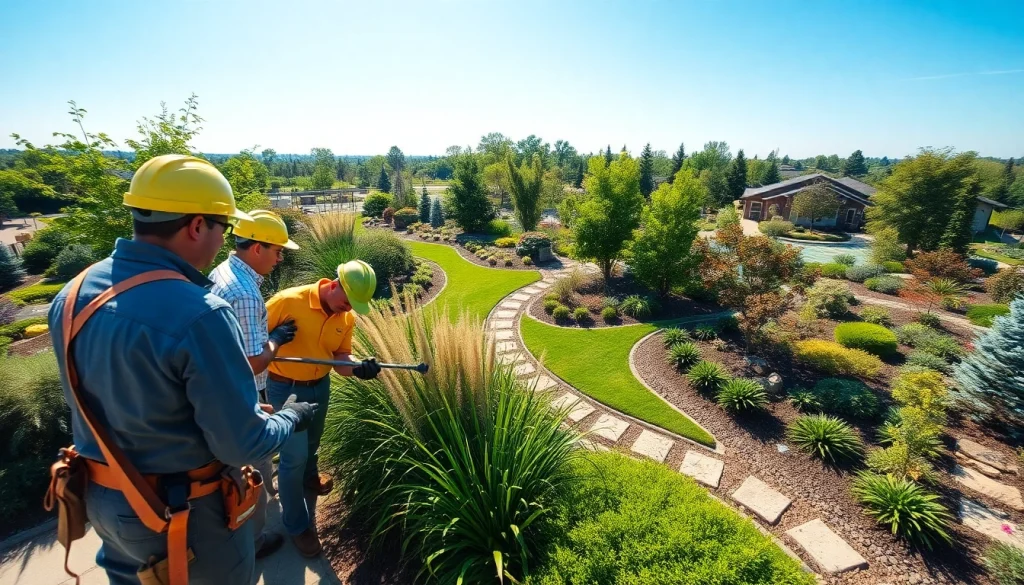Understanding the Role of Commercial Landscaping Contractors
Commercial landscaping contractors play a pivotal role in optimizing outdoor spaces for businesses, municipalities, and institutions. They are responsible for a broad spectrum of services that enhance the aesthetic appeal, functionality, and sustainability of landscapes. These professionals not only cultivate beauty but also add significant value to properties, fostering environments where public and private enterprises can flourish. It is essential for business owners and managers to understand the nuances of what commercial landscaping contractors bring to the table.
The Importance of Professional Landscaping
Landscaping is often the first interaction clients or customers have with a business. Well-executed landscaping goes beyond mere appearance; it communicates professionalism and care about both the business and the community. Commercial landscaping contributes to the overall ambiance of business establishments, helping to create welcoming environments that positively influence customer behavior.
Statistics back up the critical importance of professional landscaping. According to surveys conducted by the National Association of Landscape Professionals, around 70% of consumers believe that businesses with attractive landscaping are more reputable than those without. Pouring resources into professional landscaping can lead to increased foot traffic, higher property values, and greater employee satisfaction in workspaces.
Key Services Offered by Landscaping Contractors
Commercial landscaping contractors provide a range of services depending on the needs of their clients. Key offerings typically include:
- Landscape Design: Custom designs tailored to the specific aesthetics and functional needs of the business.
- Installation: Planting trees, shrubs, flowers, and laying sod or turf for optimal appearance and functionality.
- Irrigation Systems: Installation and maintenance of efficient irrigation systems that conserve water while ensuring plant health.
- Maintenance Services: Regular care such as mowing, pruning, fertilization, and pest control to uphold landscape integrity.
- Hardscaping: Installation of non-plant elements like pathways, patios, walls, and other structural features.
- Seasonal Cleanup: Preparation of landscapes for changing seasons, including leaf removal and snow management.
Benefits of Hiring Commercial Landscaping Experts
Engaging professional commercial landscaping contractors yields numerous benefits:
- Expertise and Knowledge: They possess specialized knowledge about native plants, soil health, and environmental factors affecting landscape health.
- Quality Results: Professionals have access to advanced tools and technologies, ensuring efficient and high-quality work compared to DIY methods.
- Time and Cost Efficiency: Delegating landscaping tasks to experts allows businesses to focus on core operations, while contractors manage the intricacies of landscaping.
- Long-term Value: Well-maintained landscapes can significantly enhance property values and curb appeal, translating into higher market values.
- Sustainability Practices: Many contractors emphasize eco-friendly methods that reduce water usage, minimize chemical applications, and promote biodiversity.
Essential Skills for Commercial Landscaping Contractors
The effectiveness of commercial landscaping contractors hinges on a combination of technical skills, project management abilities, and exceptional customer service. These skill sets not only ensure that they deliver quality services but create a professional rapport with clients.
Technical Skills and Knowledge
Contractors must be equipped with a substantial knowledge base related to botany, horticulture, and environmental science. Understanding how different climatic conditions impact plant growth and health is crucial. This knowledge enables them to select appropriate plants and design effective irrigation systems. Furthermore, technical skills also include expertise in hardscaping techniques, pest management, and landscape design principles. They often undergo rigorous training and sometimes formal education to hone these skills, ensuring that they can deliver a comprehensive landscaping solution tailored to their clients’ needs.
Project Management in Landscaping
Project management skills play a vital role in the successful execution of landscaping projects. Contractors must efficiently plan project scopes, timelines, and budgets while coordinating resources and sourcing materials. From initial design to the final installation, effective project management holds the key to navigating complex landscaping projects efficiently. This encompasses scheduling work, managing labor, and handling unforeseen challenges, such as weather disruptions or supply delays. Strong project management also ensures that projects remain within budget, providing transparency and accountability to clients.
Customer Service Excellence in Landscaping
Customer service is paramount in landscaping. Commercial landscaping contractors must cultivate strong relationships with clients through consistent communication, responsiveness, and quality delivery. Understanding client goals and expectations helps contractors develop personalized solutions that resonate with each client’s vision. Regular follow-ups post-project completion and ongoing maintenance services further enhance customer satisfaction and loyalty. By employing a customer-centric approach, contractors can foster long-term partnerships that lead to repeat business and referrals.
Challenges Faced by Commercial Landscaping Contractors
While commercial landscaping presents numerous opportunities, it also comes with its unique set of challenges. Recognizing and addressing these challenges can significantly improve service delivery and client satisfaction.
Seasonal Variations and Climate Considerations
Landscaping is heavily influenced by seasonal variations and climate. Contractors must adapt their approaches to face challenges such as extreme weather conditions, unexpected frost, or drought. Understanding local climate realities informs plant selection, irrigation planning, and seasonal maintenance schedules. For instance, drought resistance plants may be prioritized in arid regions, ensuring sustainability while maintaining aesthetic appeal. Adaptability and continuous learning about emerging climate trends enable contractors to stay ahead of potential challenges.
Budget Constraints and Cost Management
Budget constraints can complicate landscaping projects. Businesses often depend on contractors to not only deliver high-quality services but do so within often tight financial limits. Transparent communication regarding costs and potential budgetary impacts is essential for managing client expectations. Contractors must develop estimates that consider materials, labor, and time while also factoring in contingencies for unforeseen costs. Providing clients with a variety of options can help them make more informed decisions while staying within their financial parameters.
Meeting Client Expectations in Design and Execution
Turning client visions into reality is always a challenge. Miscommunication or a misalignment of expectations can lead to dissatisfaction and conflict. Landscape contractors must invest time upfront to deeply understand client needs, preferences, and budget constraints. Visual aids, such as sketches or 3D renderings, can help clients better visualize proposed designs, minimizing the risk of misunderstandings later. Establishing clear milestones and check-in points during the project can ensure that the executed work aligns with what was promised.
Best Practices for Successful Landscaping Projects
Successful landscaping projects rely on a combination of effective strategies and best practices that account for both ecological and client needs. By implementing these practices, contractors position themselves for success while delivering exceptional results.
Effective Planning and Design Strategies
Planning is at the core of successful landscaping. Engaging with clients to gather comprehensive information on their vision, preferences, and objectives allows contractors to create tailored landscape designs. Effective use of zoning, seasonal planting schedules, and diverse plant selections can enhance aesthetic appeal while promoting ecological balance. 3D modeling and landscape visualization tools can also play a pivotal role in design planning, effectively demonstrating possible outcomes and facilitating informed decisions.
Integrating Sustainable Practices in Landscaping
The modern landscape industry increasingly emphasizes sustainability. Incorporating environmentally-friendly practices helps address ecological challenges while appealing to ecologically-conscious clients. This may involve using native plants, which require less water and fertilizers and promote local biodiversity. Additionally, implementing efficient irrigation methods, such as drip irrigation, can significantly reduce water consumption. Practices such as composting organic materials and using pervious surfaces to reduce runoff contribute to sustainability goals and create healthier landscapes.
Regular Maintenance and Upkeep Tips
Regular maintenance is crucial in prolonging the life and appeal of landscaped areas.
Here are some best practices contractors can implement:
- Routine Inspections: Schedule regular evaluations of plant health, irrigation systems, and hardscape features to identify potential issues before they escalate.
- Seasonal Adjustments: Adjust maintenance tasks according to the weather and plant growth seasons. Pruning, mulching, and fertilizing should occur at optimal times for the specific plants involved.
- Weed and Pest Control: Implement integrated pest management and preventative measures to maintain plant health without relying solely on chemical solutions.
- User Education: Educate clients on proper maintenance techniques for their unique landscapes, enabling them to contribute to the upkeep.
Measuring Success: Metrics for Landscaping Projects
To effectively gauge the success of landscaping projects, it is vital to establish clear metrics that reflect different facets of performance and impact.
Client Satisfaction and Feedback
Client feedback is one of the most direct methods of measuring success. Post-project surveys can provide valuable insights into customer experiences and satisfaction levels. Questions may center around project execution, landscaping aesthetics, professionalism, and overall value. Consistently high customer satisfaction ratings correlate with repeat business and referrals, reinforcing the importance of delivering quality service.
ROI and Cost-Benefit Analysis in Landscaping
Analyzing return on investment (ROI) for landscaping projects involves assessing both tangible and intangible benefits. Improved curb appeal can increase property market value, while well-designed outdoor spaces can enhance employee productivity and satisfaction. Contractors should provide estimates of anticipated ROI based on case studies or industry benchmarks to help clients understand potential financial impacts.
Long-Term Impact on Property Value
Finally, the ultimate success metric for landscaping projects is the long-term impact on property value. Well-maintained and thoughtfully designed landscapes generally contribute to higher property values and quicker sales. Contractors who can demonstrate their success stories through case studies or comparative value assessments will gain a competitive edge, establishing themselves as trusted partners in clients’ property enhancement journeys.





